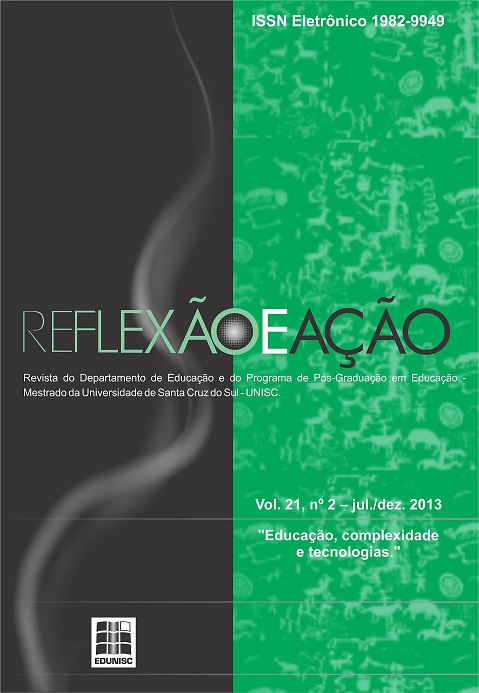GAIA AND UFERSA: A INTERINSTITUTIONAL COLLABORATION FOR APPROACH OF TECHNICAL OBJECT AS COMPLEX ENGAGEMENT IN THE TREATMENT OF COGNITIVE DISORDERS
DOI:
https://doi.org/10.17058/rea.v21i2.3971Palavras-chave:
Cognitive Disorders, Digital Technologies, Psychic and Collective Individuation, Interinstitutional CollaborationResumo
In this writing, we present a theoretical network that supports interinstitutional projects developed at both universities University of Santa Cruz do Sul - UNISC and Rural Federal University of the Semi-Arid - UFERSA. It is the analysis of cognitive processes that emerge from the experience of children and young people with developmental disorders in interactions mediated by digital technologies. The Biology of Cognition by Maturana and Varela favor the understanding of how subjects reconfigure cognition in circular movements of maintenance of the organization, while everything transforms itself in affective and cognitive terms. Simondon discusses the connections between the processes of both individualization technique and psychic and collective individuation, which happen as a becoming in which we think the subject that makes himself in the experience of living. The research projects are produced in the interface technology-education-mental health and invite us for experiences in which children and young people with cognitive disorders potentiate cognition, experiences whose emphasis is on careful, on listening and observation and analysis of processes that have to see with the power and devires of the human.Downloads
Downloads
Publicado
Como Citar
Edição
Seção
Licença
A submissão de originais para este periódico implica na transferência, pelos/as autores/as, dos direitos de publicação impressa e digital. Os direitos autorais para os artigos publicados são do/a autor/a, com direitos do periódico sobre a primeira publicação. Os/As autores/as somente poderão utilizar os mesmos resultados em outras publicações indicando claramente este periódico como o meio da publicação original. Em virtude de sermos um periódico de acesso aberto, permite-se o uso gratuito dos artigos em aplicações educacionais e científicas desde que citada a fonte conforme a licença CC-BY da Creative Commons. Creative Commons Atribuição 4.0 Internacional.
Creative Commons Atribuição 4.0 Internacional.


